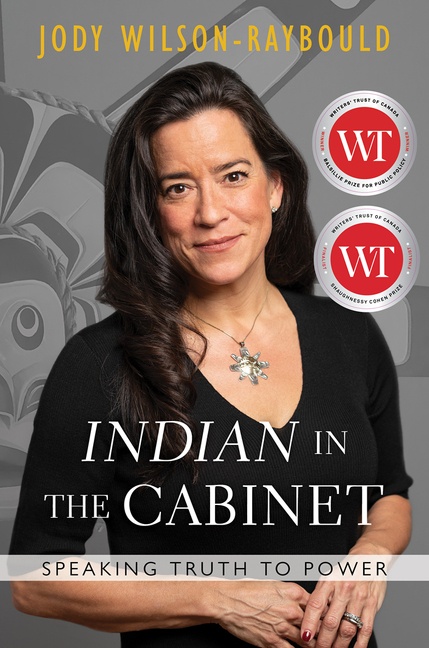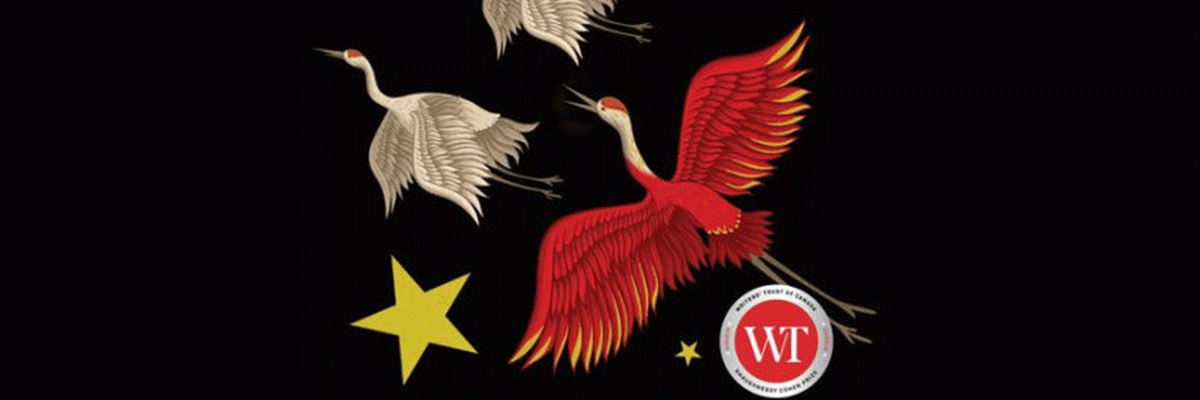
Apr 26, 2022
Among the eleven prizes that the Writer’s Trust awards annually to Canadian authors, the Shaughnessy Cohen Prize rewards literary non-fiction work on political subjects of current interest for our nation. This year, the prize was awarded to Vancouver-based journalist Joanna Chiu for her debut book China Unbound .
"As the world's second-largest economy, China is extending its influence across the globe with the complicity of democratic nations. Joanna Chiu has spent a decade tracking China's propulsive rise, from the political aspects of the multi-billion-dollar "New Silk Road" global investment project to a growing sway on foreign countries and multilateral institutions through "United Front" efforts. Chiu offers readers background on the protests in Hong Kong, underground churches in Beijing, and exile Uighur communities in Turkey, and exposes Beijing's high-tech surveillance and aggressive measures that result in human rights violations against those who challenge its power. The new world disorder documented in China Unbound lays out the disturbing implications for global stability, prosperity, and civil rights everywhere."
The other books on the short list of titles for 2022 were:
- The Two Michaels by Mike Blanchfield and Fen Osler Hampson
- Flora! By Flora MacDonald and Geoffrey Stevens
- The Next Age of Uncertainty by Stephen Poloz
- Indian in the Cabinet: Speaking Truth to Power by Jody Wilson-Raybould.
Get your hands on a copy, available in different formats, to enjoy the critically acclaimed political reads.
2022 Shaughnessy Cohen Prize for Political Writing short listby Emilie_BPO_OPL
Short list
The Two Michaels
Innocent Canadian Captives and High-stakes Espionage in the US-China Cyber War
By Blanchfield, Mike(Book - 2021)"Landing in Vancouver on a flight from Hong Kong on December 2018, Chinese telecom executive Meng Wanzhou was arrested by Canadian authorities with an American extradition warrant. The US Department of Justice accused Meng of fraud and bypassing sanctions against Iran. Nine days later, in an act of retaliation, China arrested two Canadians--Michael Spavor, an entrepreneur, and Michael Kovrig, a peace advocate--charging them with spying. Imprisoned and interrogated, the Two Michaels became hostages in a tense showdown between China and the United States over not only the Meng extradition but whether East or West will control the future of the internet. In this timely and essential book, journalist Mike Blanchfield and international affairs expert Fen Hampson combine groundbreaking original reporting and keen analysis to tell this gripping and ongoing story of cyber espionage, life-and-death diplomacy, and global superpowers in conflict."--Provided by publisher.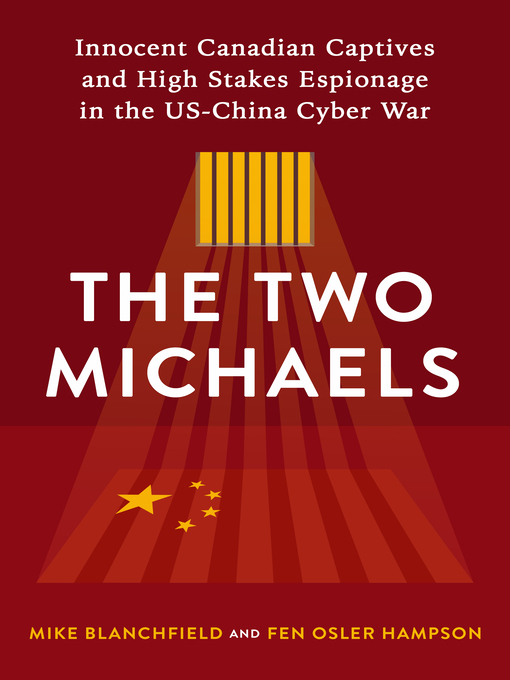
The Two Michaels
Innocent Canadian Captives and High-stakes Espionage in the US-China Cyber War
By Blanchfield, Mike(eBook - 2021)"Landing in Vancouver on a flight from Hong Kong on December 2018, Chinese telecom executive Meng Wanzhou was arrested by Canadian authorities with an American extradition warrant. The US Department of Justice accused Meng of fraud and bypassing sanctions against Iran. Nine days later, in an act of retaliation, China arrested two Canadians--Michael Spavor, an entrepreneur, and Michael Kovrig, a peace advocate--charging them with spying. Imprisoned and interrogated, the Two Michaels became hostages in a tense showdown between China and the United States over not only the Meng extradition but whether East or West will control the future of the internet. In this timely and essential book, journalist Mike Blanchfield and international affairs expert Fen Hampson combine groundbreaking original reporting and keen analysis to tell this gripping and ongoing story of cyber espionage, life-and-death diplomacy, and global superpowers in conflict."--Provided by publisher.- "As the world's second-largest economy, China is extending its influence across the globe with the complicity of democratic nations. Joanna Chiu has spent a decade tracking China's propulsive rise, from the political aspects of the multi-billion-dollar "New Silk Road" global investment project to a growing sway on foreign countries and multilateral institutions through "United Front" efforts. Chiu offers readers background on the protests in Hong Kong, underground churches in Beijing, and exile Uighur communities in Turkey, and exposes Beijing's high-tech surveillance and aggressive measures that result in human rights violations against those who challenge its power. The new world disorder documented in China Unbound lays out the disturbing implications for global stability, prosperity, and civil rights everywhere."
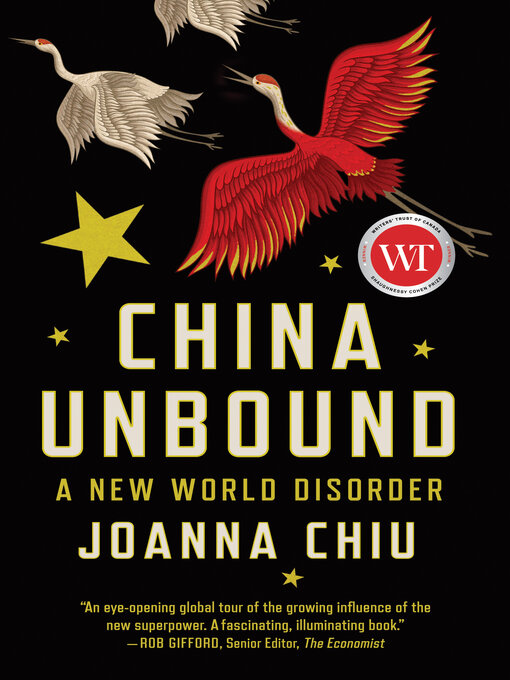 "As the world's second-largest economy, China is extending its influence across the globe with the complicity of democratic nations. Joanna Chiu has spent a decade tracking China's propulsive rise, from the political aspects of the multi-billion-dollar "New Silk Road" global investment project to a growing sway on foreign countries and multilateral institutions through "United Front" efforts. Chiu offers readers background on the protests in Hong Kong, underground churches in Beijing, and exile Uighur communities in Turkey, and exposes Beijing's high-tech surveillance and aggressive measures that result in human rights violations against those who challenge its power. The new world disorder documented in China Unbound lays out the disturbing implications for global stability, prosperity, and civil rights everywhere."
"As the world's second-largest economy, China is extending its influence across the globe with the complicity of democratic nations. Joanna Chiu has spent a decade tracking China's propulsive rise, from the political aspects of the multi-billion-dollar "New Silk Road" global investment project to a growing sway on foreign countries and multilateral institutions through "United Front" efforts. Chiu offers readers background on the protests in Hong Kong, underground churches in Beijing, and exile Uighur communities in Turkey, and exposes Beijing's high-tech surveillance and aggressive measures that result in human rights violations against those who challenge its power. The new world disorder documented in China Unbound lays out the disturbing implications for global stability, prosperity, and civil rights everywhere."- "Flora Isabel MacDonald - politician, humanitarian, adventurer, and role model for a generation of women - was known across Canada and beyond simply as Flora. In her memoir, co-authored by award-winning journalist and author Geoffrey Stevens, she tells her personal story for the very first time. Flora describes her amazing journey from her childhood and secretarial school in Cape Breton through her years in backroom Progressive Conservative politics, to elected office and her appointment as Canada's first female foreign minister. Finally, she details her exceptional humanitarian work in India and in war-torn Africa and Afghanistan. Flora was driven by a lifelong conviction that there is nothing a woman cannot achieve in a world controlled by men, and she pursued this conviction in everything she did, carving a path for women in Parliament. She won international acclaim for bringing 60,000 Vietnamese refugees to Canada, and for engineering the rescue of six American hostages in Tehran in a top-secret collaboration with the CIA known as the the Canadian Caper. She exposed the inhumane treatment of inmates at Kingston's Prison for Women. She defied male chauvinists in the Progressive Conservative party by running for its leadership, and she introduced the Employment Equity Act to guarantee women equal access to federal jobs. Flora was brave. She was relentless. She was controversial. She was a force of nature. In her own words and drawing from interviews with those who knew her, Flora grants us insight into this exceptional woman who changed the course of history."--Provided by publisher.
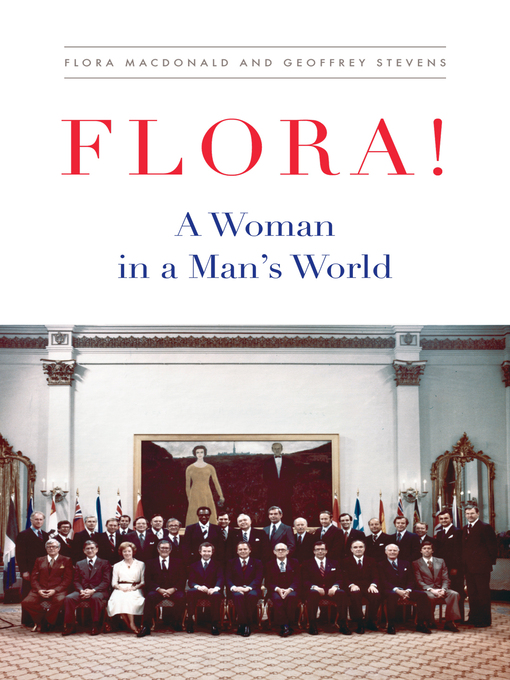 "Flora Isabel MacDonald - politician, humanitarian, adventurer, and role model for a generation of women - was known across Canada and beyond simply as Flora. In her memoir, co-authored by award-winning journalist and author Geoffrey Stevens, she tells her personal story for the very first time. Flora describes her amazing journey from her childhood and secretarial school in Cape Breton through her years in backroom Progressive Conservative politics, to elected office and her appointment as Canada's first female foreign minister. Finally, she details her exceptional humanitarian work in India and in war-torn Africa and Afghanistan. Flora was driven by a lifelong conviction that there is nothing a woman cannot achieve in a world controlled by men, and she pursued this conviction in everything she did, carving a path for women in Parliament. She won international acclaim for bringing 60,000 Vietnamese refugees to Canada, and for engineering the rescue of six American hostages in Tehran in a top-secret collaboration with the CIA known as the the Canadian Caper. She exposed the inhumane treatment of inmates at Kingston's Prison for Women. She defied male chauvinists in the Progressive Conservative party by running for its leadership, and she introduced the Employment Equity Act to guarantee women equal access to federal jobs. Flora was brave. She was relentless. She was controversial. She was a force of nature. In her own words and drawing from interviews with those who knew her, Flora grants us insight into this exceptional woman who changed the course of history."--Provided by publisher.
"Flora Isabel MacDonald - politician, humanitarian, adventurer, and role model for a generation of women - was known across Canada and beyond simply as Flora. In her memoir, co-authored by award-winning journalist and author Geoffrey Stevens, she tells her personal story for the very first time. Flora describes her amazing journey from her childhood and secretarial school in Cape Breton through her years in backroom Progressive Conservative politics, to elected office and her appointment as Canada's first female foreign minister. Finally, she details her exceptional humanitarian work in India and in war-torn Africa and Afghanistan. Flora was driven by a lifelong conviction that there is nothing a woman cannot achieve in a world controlled by men, and she pursued this conviction in everything she did, carving a path for women in Parliament. She won international acclaim for bringing 60,000 Vietnamese refugees to Canada, and for engineering the rescue of six American hostages in Tehran in a top-secret collaboration with the CIA known as the the Canadian Caper. She exposed the inhumane treatment of inmates at Kingston's Prison for Women. She defied male chauvinists in the Progressive Conservative party by running for its leadership, and she introduced the Employment Equity Act to guarantee women equal access to federal jobs. Flora was brave. She was relentless. She was controversial. She was a force of nature. In her own words and drawing from interviews with those who knew her, Flora grants us insight into this exceptional woman who changed the course of history."--Provided by publisher.The Next Age of Uncertainty
How the World Can Adapt to A Riskier Future
By Poloz, Stephen S.(Book - 2022)"The accessible roadmap to navigating an unpredictable economic earthquake. People are worried about their financial future. The workforce is aging, meaning slower economic growth. Debt is going through the roof, both public and private. Automation and technological revolution are putting people out of work, leading to ever-growing inequality and social breakdown. Add the existential threat of climate change to the list of economic stresses. Then pile on a global pandemic that has cost the global economy trillions. It’s not surprising that people are worried. Crises don’t unfold because of just one of these factors happening in isolation. Former Governor of the Bank of Canada, Stephen Poloz, calls these factors 'tectonic' stresses. As he demonstrates, using examples from previous cycles of boom and bust, major crises occur when several forces converge, like tectonic plates. When the built-up energy is released, the result is an economic crisis. Whether we are barreling towards another financial crisis depends on how the current stresses are handled. Slow growth can be a good thing, as it means low interest rates, and could lead to more home ownership. Our panic about debt, Poloz argues, is a holdover from the financial conditions of the 1930s. Technological change can mean disruption and inequality--but can also lead to greater prosperity for all in the long term, something we can accelerate with good policy. And while responding to climate change will be expensive and difficult, it can also lead to better policies around investment and employment, to say nothing of technological advance. Using examples from the last 150 years of economic history, Stephen Poloz explains ideas sophisticated enough for institutional investors and policymakers in language accessible enough for general readers who are just worried about renewing their mortgages in a climate of fluctuating interest rates."--Provided by publisher.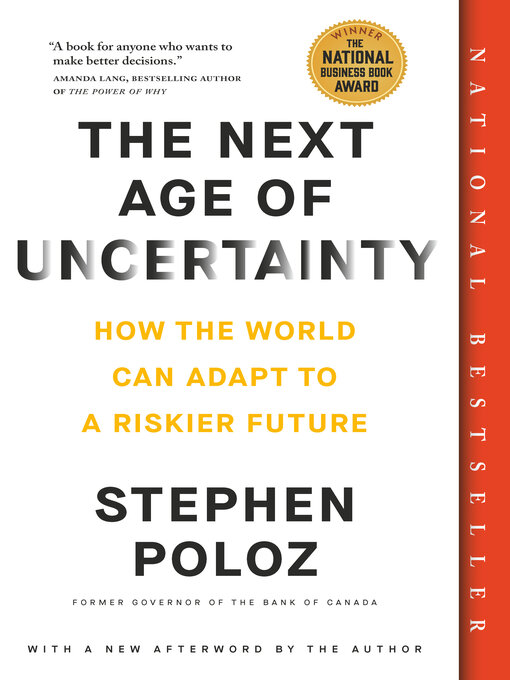
The Next Age of Uncertainty
How the World Can Adapt to A Riskier Future
By Poloz, Stephen S.(eBook - 2022)"The accessible roadmap to navigating an unpredictable economic earthquake. People are worried about their financial future. The workforce is aging, meaning slower economic growth. Debt is going through the roof, both public and private. Automation and technological revolution are putting people out of work, leading to ever-growing inequality and social breakdown. Add the existential threat of climate change to the list of economic stresses. Then pile on a global pandemic that has cost the global economy trillions. It’s not surprising that people are worried. Crises don’t unfold because of just one of these factors happening in isolation. Former Governor of the Bank of Canada, Stephen Poloz, calls these factors 'tectonic' stresses. As he demonstrates, using examples from previous cycles of boom and bust, major crises occur when several forces converge, like tectonic plates. When the built-up energy is released, the result is an economic crisis. Whether we are barreling towards another financial crisis depends on how the current stresses are handled. Slow growth can be a good thing, as it means low interest rates, and could lead to more home ownership. Our panic about debt, Poloz argues, is a holdover from the financial conditions of the 1930s. Technological change can mean disruption and inequality--but can also lead to greater prosperity for all in the long term, something we can accelerate with good policy. And while responding to climate change will be expensive and difficult, it can also lead to better policies around investment and employment, to say nothing of technological advance. Using examples from the last 150 years of economic history, Stephen Poloz explains ideas sophisticated enough for institutional investors and policymakers in language accessible enough for general readers who are just worried about renewing their mortgages in a climate of fluctuating interest rates."--Provided by publisher.- " “Indian” in the Cabinet: Speaking Truth to Power is the story of why Wilson-Raybould got into federal politics, her experience as an Indigenous leader sitting around the Cabinet table, her proudest achievements, the very public SNC-Lavalin affair, and how she got out and moved forward."
- "Indian in the Cabinet: Speaking Truth to Power is the story of why Wilson-Raybould got into federal politics, her experience as an Indigenous leader sitting around the Cabinet table, her proudest achievements, the very public SNC-Lavalin affair, and how she got out and moved forward."--Publisher.

